Years ago, I had a bad fall and injured my tailbone. It was one of the WORST pains I’d ever experienced. All the nerves surrounding my spine and lower back felt like they were on FIRE…Yoouuch!!!
I was traveling for work at the time, and had to be pumped full of morphine just to get on the plane back home. I was bedridden for 3 weeks and miserable. I desperately tried every natural remedy I knew about to bring down the inflammation… and some things worked better than others.
One of the most effective herbal supplements I took was a daily turmeric supplement. Thankfully, after several more weeks of turmeric supplements, acupuncture, and taking it easy, my tailbone had a full recovery.
This was the first time I experienced for myself how powerful turmeric is. I’ve since learned that turmeric is even more amazing, and that it is literally PACKED with health benefits that can improve your skin, your heart, your mood, and even your waistline!
To show you how remarkable this spice is, here’s a breakdown of research on 13 proven health benefits of turmeric.
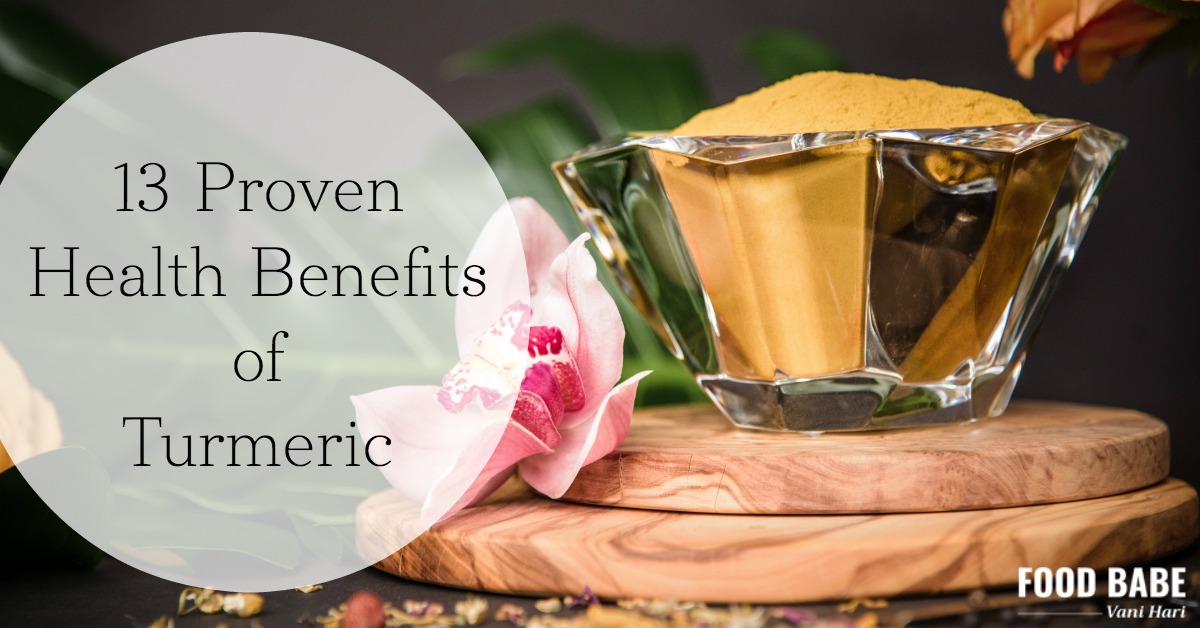
Turmeric Health Benefit #1
Turmeric is Anti-Inflammatory: The active ingredient in turmeric is curcumin, a potent anti-inflammatory that helps maintain healthy inflammation responses.
The typical western diet (think lots of processed foods, sugar, and alcohol) leads to what is called “chronic inflammation” in the body. Doctors believe this inflammation is a silent killer, because it sets the body up to be the perfect host for diseases like heart disease (1), cancer (2), Alzheimer’s, and even obesity (3).
That’s why you want to do everything you can to bring down inflammation, including eating more unprocessed whole vegetables and fruit along with specific spices (like turmeric) and herbs known to fight inflammatory responses.
One of the main anti-inflammatory components of turmeric is called curcumin (4), which one scientific study found to be as effective as some over-the-counter drugs (5) in bringing down inflammation in the body. The researchers actually found that aspirin and ibuprofen (active ingredient in Advil) were the LEAST effective out of all of the anti-inflammatory compounds they studied.
Turmeric Health Benefit #2
Turmeric Supports Healthy Joints: Beneficial in promoting overall joint health and mobility.
As the curcumin in turmeric is an anti-inflammatory, it can benefit the joints and help keep them from getting inflamed and swollen. This was demonstrated in a scientific study (6) on rheumatoid arthritis patients. Rheumatoid arthritis (RA) is a chronic inflammatory disorder that causes painful swelling in the joints. Researchers found that 500 mg. of daily curcumin was more effective than the prescription drug Diclofenac when given to RA patients.
When it comes to taking turmeric for your joints, it was shown most effective when taken before symptoms kick in (7), as a preventative measure to keep your joints healthy, pain-free, and mobile. But some studies have demonstrated it can help treat osteoarthritis (8) (a degenerative disease of the joint) as well.
Turmeric Health Benefit #3
Turmeric Promotes Heart Health: The properties support the overall health of the cardiovascular system.
There are several lifestyle factors and conditions in the body that can lead the heart disease – which is the #1 cause of death in the world. As discussed earlier, chronic inflammation plays a major role in heart disease, so taking turmeric as an anti-inflammatory can help prevent heart disease (9) and heart attacks (10).
One of the most interesting benefits of curcumin is how it can improve the lining of blood vessels (known as the endothelium). When the endothelium isn’t working properly, it can’t properly regulate blood pressure and clotting, which can lead to heart disease (11).
We’ve all heard that exercise is good for the heart, right? One study showed that taking curcumin is as effective as aerobic exercise (12) at improving vascular endothelial function.
Turmeric Health Benefit #4
Turmeric Encourages Healthy Cholesterol Levels.
High cholesterol is known to be caused by oxidative stress (13), brought on to the body by chronic inflammation and high blood sugar. So, again, reducing inflammation in the body supports healthy cholesterol levels.
One study found curcumin comparable to prescription drug Lipitor (14) on endothelial dysfunction in reducing in inflammation and markers of oxidative stress. An earlier animal study (15) showed similar results on the body.
One study of human volunteers found that taking 500 mg. of daily curcumin dropped their total cholesterol by 11.63% (16), while their HDL (the “good” cholesterol) went up 29% in just 7 days.
Turmeric Health Benefit #5
Turmeric Boosts Stress Tolerance: As an adaptogen, it helps counteract the adverse effects of everyday stress on the body.
If you feel stressed, adaptogens should be your new best friend! In herbal medicine, some botanicals are termed “adaptogens”, which means they have the ability to modulate the release of stress hormones from the adrenal glands. This can help you adapt better to physical and emotional stress and be more resilient to anything that comes your way. They also help to keep your hormones balanced.
The curcumin in turmeric is a known adaptogen that has the ability to decrease the secretion of stress hormones in the body (17). In 2011, researchers in India found that turmeric had several adaptogenic properties that help with body weight, memory, blood sugar, and moreover that it helps the body maintain healthy stress hormone levels (18).
Turmeric Health Benefit #6
Turmeric Supports Weight Loss: Curcumin can positively influence weight management in overweight people.
Elevated stress can cause sudden weight gain. When stress hormones (cortisol) get out of whack, fat accumulates near the stomach (19) because the cells in the stomach are more sensitive to cortisol, and very effective at storing energy. As turmeric can help you balance your stress hormones, it can help stop that extra spare tire from forming around your waist.
The anti-inflammatory properties in curcumin are able to fight obesity too. One study actually found that taking curcumin can reduce the growth of fat cells (20)!
Turmeric Health Benefit #7
Turmeric Supports Healthy Metabolism: Aids in maintaining normal blood sugar levels.
Turmeric has been used to treat diabetes (21) in Ayurvedic and Traditional Chinese Medicine for years. A 2013 review of scientific studies (22) found that curcumin stabilizes glucose levels in the blood and also helped with complications related to diabetes. In one study, 100 overweight people with type 2 diabetes took either 300 mg. of curcumin or a placebo for 12 weeks. The researchers found that those taking curcumin had significantly lower fasting blood glucose (23).
There is promising research suggesting curcumin may reduce the risk of developing diabetes in high risk people too. In a 2012 study, all participants who took curcumin extract for 9 months didn’t develop diabetes (24), although they were prediabetic. While 16% of the prediabetic participants who took a placebo did develop diabetes after the 9 months.
Turmeric Health Benefit #8
Turmeric Optimizes Vitality: Its powerful antioxidant properties fight excess free radicals in the body that can damage cells and diminish health.
Antioxidants zap free radicals in the body that can lead to cancer, neurodegenerative disease and other disorders. With all of the processed “dead” foods that creep their way into our diets… we can all use more of antioxidants in our life! The curcumin in turmeric is a powerful antioxidant (25). Even better, curcumin is special in that it’s been shown to boost the antioxidant enzymes (26) in your body, giving you even more benefit (27)!
Turmeric Health Benefit #9
Turmeric Supports Brain Health: Helps maintain healthy cognitive function and working memory.
Curcumin has the amazing ability to boost a protein in the brain called BDNF (28). This important protein – brain-derived neurotrophic factor (BDNF) (29) – is responsible for helping the brain grow. It’s been shown to increase neurons and form new connections in the brain – two things we really need as we get older. BDNF builds up the “roadway” in your brain so that neurotransmitters like serotonin and dopamine can travel more easily where they need to go. Which is why high BDNF levels are linked to better memory (30) and mood… And, when BDNF levels are low, the risk of Alzheimer’s (31) and depression (32) goes up.
Turmeric Health Benefit #10
Turmeric Promotes Radiant Skin: By providing proper nourishment, it helps your body produce more radiant and healthy-looking skin.
Turmeric is an anti-aging powerhouse (33). Given that it’s an antioxidant – it can fight oxidative damage and boost the overall look of the skin. It’s anti-inflammatory properties help fight the appearance of aging skin (34) as well. A scientific review of studies in 2016 found that turmeric has the ability to improve numerous skin conditions (35) when it’s either ingested or applied directly on the skin.
Turmeric Health Benefit #11
Turmeric Improves Mood: Curcumin helps to reduces symptoms of mild mood changes.
As the curcumin in turmeric boosts the brain-builder protein BDNF, it may help prevent depression (36). Curcumin can also give a boost to serotonin and dopamine (37) – two “happy” chemicals in the brain. It shows promise for helping people who already have depression too. In one study, 60 people diagnosed with depression were given either Prozac, curcumin, or a combo of the two. Those who took just the curcumin had improvements in their mood on par with Prozac (38) – while those who took both had the best results during the 6 week study.
Turmeric Health Benefit #12
Soothes Digestion: Reduces symptoms of bloating and gas related to occasional indigestion.
Turmeric has been used for centuries in Ayurvedic medicine (39) to improve digestion and heal gut inflammation – likely due to its nature as an anti-inflammatory. Also the curcumin in turmeric stimulates the gallbladder (40), helping your body produce bile to break down food and improve digestion. One study found that turmeric has the ability to reduce bloating and gas symptoms (41) in people who have indigestion. Some research shows curcumin can help people with ulcerative colitis (42) too – an inflammatory bowel disease that causes sores in the digestive tract.
Turmeric Health Benefit #13
Reduces Risk of Cancer: Curcumin’s anti-cancer properties may inhibit the growth of tumors and reduce the spread of cancer.
The curcumin in turmeric may be able to slow the development and growth of cancer in the body. Animal research indicates that cucurmin has the ability to actually kill tumor cells (43) and inhibit tumor growth (44). This may prevent cancerous cells from growing (45) in the body.
When it comes to preventing cancer before it starts, one human research study found that taking 4 grams of daily curcumin reduced the number of precancerous lesions (46) in the colon by 40%. The research suggests that curcumin is most beneficial in breast, bowel, stomach, and skin cancer (47).
Curcumin has been shown to enhance chemotherapy (48) treatments for colon cancer. Another 2017 study found that curcumin enhanced tumor sensitivity to chemotherapy (49) in pancreatic cancer, indicating that it is useful in combating chemo-resistance.
Turmeric has an incredible history…
Turmeric has been used in ancient medicine for over 4,000 years, going back to when residues of turmeric were found in ancient pots in New Delhi, India. Turmeric is still in use in Ayurvedic medicine today, an ancient medical system that originated in India. It’s medicinal properties and components (primarily curcumin) have been the subject of thousands of peer-reviewed and published studies.
The 3 different forms of turmeric:
There are three basic forms of turmeric. Each option has its own benefits, depending on what you want to do with it.
- Fresh Turmeric Root – You can find fresh organic turmeric root in the produce section in natural food stores like Whole Foods or Sprouts (some conventional grocery stores carry it too). This is the best form when adding turmeric to fresh pressed juice.
- Ground Turmeric – Found in the spice aisle at almost every grocery store. This is the best form for seasoning vegetables and meals. Just make sure that you choose organic, because many conventional spices are irradiated and grown with synthetic pesticides.
- Turmeric Supplements – This is the easiest sure-fire way to make sure you get the turmeric in your diet daily.
(Try the Truvani Daily Turmeric Supplement here)
What to look for in a Turmeric Supplement:
The primary reason to take a supplement is to provide your body with nutrients that are not already abundant in your normal diet. Ironically however… it’s easy to sabotage your health with supplements if you’re not careful. Look for turmeric supplements that…
- Include both Turmeric Root and Turmeric Extract – You’ll generally find two different types of turmeric in supplements. First, Turmeric Root, which is the powdered form of whole turmeric. Second is Turmeric Extract, which is the concentrated form of whole turmeric, standardized for 95% curcuminoids. Most supplements do not contain turmeric root, but they should. Some research shows that all of the components of turmeric (not just the curcumin) work together more effectively than taking curcumin alone (50).
- Certified Organic – This ensures the ingredients were not grown with synthetic pesticides and other harmful chemicals, and also that toxic solvents hexane were not used during production. This is especially important in a supplement, as you will be consuming it daily.
- Tested for Heavy Metals – There are toxins in many products and in our environment that can lead to disease. Try to surround yourself and your family with the purest, most natural products (including supplements). Look for turmeric supplements that are tested regularly for mercury, lead, cadmium, arsenic, or glyphosate, and that does not carry a Prop 65 warning label.
- Contain Black Pepper – Curcumin isn’t absorbed by the body well on its own. To help your body get the most benefits, consume it with black pepper, which contains piperine – which can increase bioavailability by up to 2,000% (51)! It’s also a good idea to take your turmeric supplement with food, as fat and oil also increases the bioavailability.
- Packaged in Dark Glass – You don’t want unnecessary chemicals tainting your turmeric supplement and you want to preserve every single nutrient. Dark (amber) glass bottles don’t leach harmful chemicals that plastics can and provide excellent UV protection. This is important because UV rays can sometimes damage the contents.
- Uncoated Tablets – This makes it easy to add turmeric to recipes and drinks, instead of swallowing a whole pill or measuring out a messy powder.
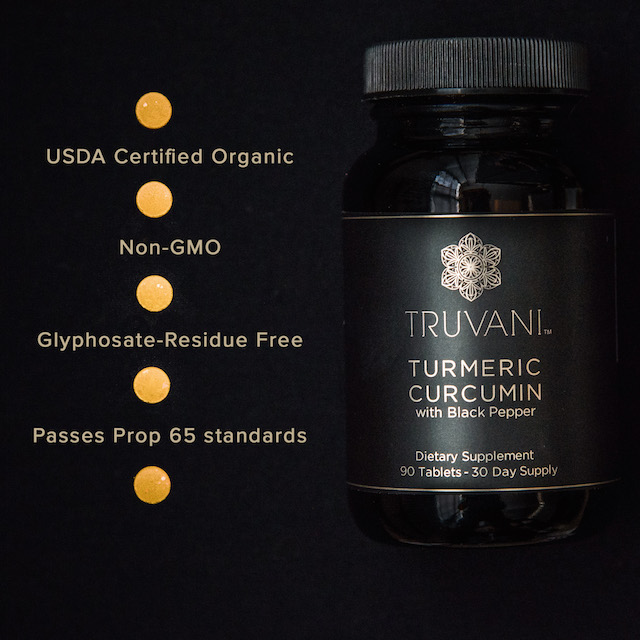 (Try the Truvani Daily Turmeric Supplement here)
(Try the Truvani Daily Turmeric Supplement here)
How to properly store turmeric:
Fresh turmeric: The best way to store fresh turmeric root is in the refrigerator. You will first want to clean and completely dry the turmeric root. Then wrap the root in a paper towel and place in an airtight container. Fresh turmeric will last 1-2 weeks or more if refrigerated.
Ground turmeric: To store turmeric powder it is important to keep it in a cool, dry place. Ideally this will be in a cabinet or pantry away from heat or excessive light.
Turmeric supplements: Ideally, turmeric tablets should be stored in an amber glass bottle, to provide UV protection. Keep it away from excessive heat and light as much as possible.
Turmeric side effects…
Side effects from eating turmeric or taking supplements are rare, but it’s important to know about them. When turmeric is taken in high doses, it may lead to upset stomach, dizziness, or diarrhea. Some people are allergic to turmeric and have an allergic reaction. During pregnancy, turmeric is not recommended because it is associated with stimulating the uterus.
Known drug interactions for turmeric include medications that slow blood clotting, because turmeric is also known to slow blood clotting. So, be careful when taking turmeric with these types of drugs such as such as aspirin, Plavix, ibuprofen, naproxen, and warfarin. Always check with your healthcare provider before taking turmeric.
5 Easy ways to add turmeric to your diet:
1. Brew Turmeric tea: Bring 1 cup of water to a boil and then stir in ¼ teaspoon of organic ground turmeric, fresh grated turmeric or an uncoated turmeric tablet. Allow it to simmer for 10 minutes. You can stir in honey or fresh lemon juice for added flavor.
2. Mix up a curry powder: A basic curry powder can be made with 8 parts ground coriander, 4 parts ground cumin and 1 part each of ground turmeric and cayenne or paprika. You can decrease the cayenne and use paprika instead if you don’t want it spicy, and store this in a glass container in your pantry for up to 6 months.
3. Blend it into a smoothie: Add organic turmeric powder, grated root, or uncoated turmeric tablets to a flavorful smoothie and you won’t even taste it! Granted… it may change the color of your smoothie, since it’s got such a strong pigment.
4. Juice it: When making fresh pressed green juice, add in up to 1″ of organic fresh turmeric to your juicer (per serving).
5. Season roasted veggies: Toss some fresh vegetables (like diced potatoes, cauliflower, or brussel sprouts) with a dash of olive oil and ground turmeric, along with any other seasonings you like. Roast at 400 degrees, tossing once until done, usually about 30-40 minutes.
Add turmeric to your meals with delicious recipes…
Here are some of my favorite recipes that I cook in my own kitchen with turmeric. Give them a try, I’m sure you won’t be disappointed!
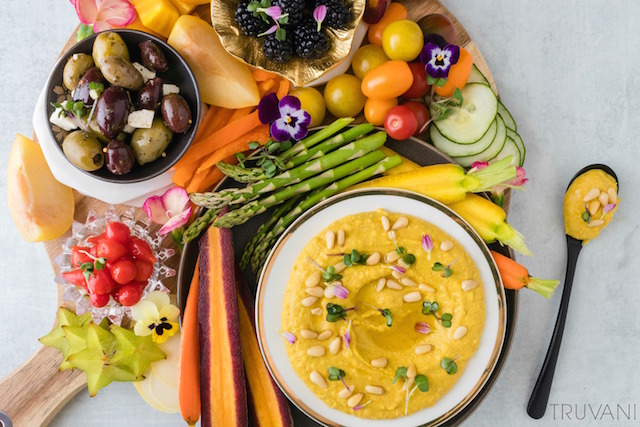
Meals:
Snacks:
- Turmeric Tea
- Citrus Blast Smoothie
- Golden Milk (Warm or Iced)
- Turmeric Cooler Juice
- Healing Iced Turmeric Latte
Desserts:
Want to learn more about turmeric?
When you pick up your first bottle of Truvani Turmeric, I’ll send you two complimentary eBooks:
- Truvani Life: I’ll walk you through my top healthy-living tips. I answer some of your most-asked questions about what to eat (and what to avoid) to stay fit and healthy.
- The Ultimate Guide To Turmeric: A beautiful 35-page guide to help you better understand the remarkable power of Turmeric, the ancient Ayurvedic remedy. I’ll show you how to incorporate it into your daily life with delicious recipes, specific product recommendations, and more.
Get your Truvani Turmeric + 2 Free eBooks here
Our mission at Truvani is to choose the absolute best ingredients, as nutrient-dense as possible, without processed chemical ingredients invented by the food industry to increase their bottom line. We enjoy food the way it was meant to be – real, whole, organic, and full of nutrients. Experience it for yourself!
If you know anyone who could benefit from turmeric, please share this post with them.
Xo,
Vani
*This statement has not been evaluated by FDA. This product is not intended to diagnose, treat, cure or prevent any disease.
As with any dietary supplement, you should discuss with your healthcare professional prior to use. If you are breastfeeding, pregnant, or considering pregnancy, you should consult your healthcare professional prior to taking any supplements. Discontinue use and contact your healthcare professional if you experience any side effects or an allergic reaction. Keep out of reach of children.
References:
- https://www.ncbi.nlm.nih.gov/pubmed/12490960
- https://www.ncbi.nlm.nih.gov/pubmed/12490959
- https://www.ncbi.nlm.nih.gov/pubmed/21633179
- https://www.ncbi.nlm.nih.gov/pubmed/19594223
- https://www.ncbi.nlm.nih.gov/pubmed/15489888
- https://www.ncbi.nlm.nih.gov/pubmed/22407780
- https://pubs.acs.org/doi/full/10.1021/np050327j
- https://www.ncbi.nlm.nih.gov/pmc/articles/PMC5036591/
- https://www.ncbi.nlm.nih.gov/pubmed/19233493
- https://www.ncbi.nlm.nih.gov/pubmed/22481014
- https://www.ncbi.nlm.nih.gov/pubmed/10543305
- https://www.ncbi.nlm.nih.gov/pubmed/23146777
- https://www.ncbi.nlm.nih.gov/pubmed/10443930
- https://www.ncbi.nlm.nih.gov/pubmed/18588355
- https://www.ncbi.nlm.nih.gov/pubmed/10559523
- https://www.ncbi.nlm.nih.gov/pubmed/1291482
- https://www.ncbi.nlm.nih.gov/pubmed/21479964
- https://www.ncbi.nlm.nih.gov/pubmed/21479964
- https://www.sciencedaily.com/releases/2000/11/001120072314.htm
- https://www.ncbi.nlm.nih.gov/pubmed/23339049
- https://www.ncbi.nlm.nih.gov/pmc/articles/PMC3857752/
- https://www.ncbi.nlm.nih.gov/pmc/articles/PMC3857752/
- https://www.ncbi.nlm.nih.gov/pubmed/22930403
- http://care.diabetesjournals.org/content/35/11/2121
- https://www.ncbi.nlm.nih.gov/pubmed/17569207
- https://www.ncbi.nlm.nih.gov/pubmed/15650394
- https://www.sciencedirect.com/science/article/pii/S1357272598000156
- https://www.sciencedirect.com/science/article/pii/S0166432812006997
- https://www.ncbi.nlm.nih.gov/pmc/articles/PMC2504526/
- https://www.ncbi.nlm.nih.gov/pmc/articles/PMC3281036/
- https://www.ncbi.nlm.nih.gov/pubmed/26819457
- https://www.sciencedirect.com/science/article/pii/S0006322303001811
- https://www.ncbi.nlm.nih.gov/pubmed/20205886
- https://www.ncbi.nlm.nih.gov/pubmed/20388102
- https://onlinelibrary.wiley.com/doi/abs/10.1002/ptr.5640
- https://www.sciencedirect.com/science/article/pii/S0006322303001811
- https://link.springer.com/article/10.1007/s00213-008-1300-y
- https://www.ncbi.nlm.nih.gov/pubmed/23832433
- http://www.ayurvedacollege.com/articles/students/turmeric
- https://www.ncbi.nlm.nih.gov/pubmed/10102956
- https://www.ncbi.nlm.nih.gov/pubmed/2699615
- https://www.ncbi.nlm.nih.gov/pubmed/17101300
- https://www.ncbi.nlm.nih.gov/pmc/articles/PMC2758121/
- https://www.ncbi.nlm.nih.gov/pubmed/9973206
- https://www.ncbi.nlm.nih.gov/pubmed/12680238
- https://www.ncbi.nlm.nih.gov/pubmed/21372035
- https://www.cancerresearchuk.org/about-cancer/cancer-in-general/treatment/complementary-alternative-therapies/individual-therapies/turmeric
- http://journals.plos.org/plosone/article?id=10.1371/journal.pone.0057218
- https://academic.oup.com/carcin/article-abstract/doi/10.1093/carcin/bgx065/3924866/Curcumin-sensitizes-pancreatic-cancer-cells-to?redirectedFrom=fulltext
- http://turmeric.hu/turmeric_curcumin_publication/Bharat_B_Aggarwal/Bharat-B-Aggarwal-Curcumin-a-component-of-turmeric-From-farm-to-pharmacy.pdf
- https://www.ncbi.nlm.nih.gov/pubmed/9619120



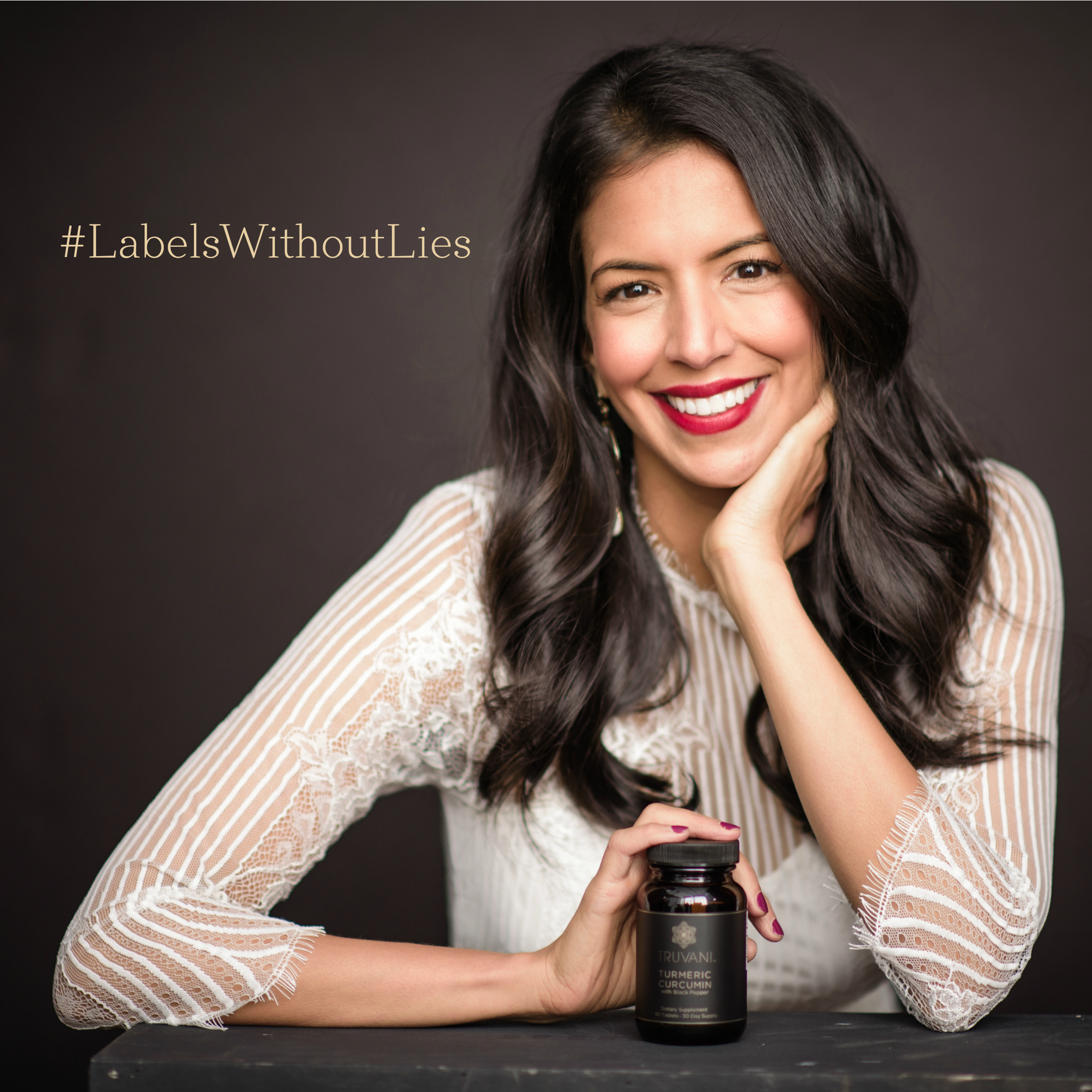



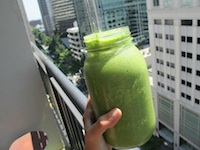


I would have definitely tried the truvani turmeric but unfortunately it’s not a safe option for me or my family. I have several family members (four kids, a teen, and two adults) who are severely allergic (anaphylactic) to milk/dairy products, eggs, fish, shellfish, meat, wheat, gelatin, soy, and coconut. It just wouldn’t be a safe product in the family since I know several of these are in the same facility where the turmeric is made and even in the same facility as the recently made truvani protein powder.
I hope soon you find a facility that could be better for these products and free from these allergens. Especially considering you can’t find products anywhere near/like these (in terms of quality) anywhere else.
The biggest thing to remember is if you want to feel benefits then you need to watch what you put into your body. If you are still eating processed foods or eating heavy amount of animal based food products- you aren’t going to see much of a change.
What is the difference between turmeric and cummin
Vani!
Thanks for sharing with us more nutritional goodness.
Could you describe which extraction process is used to ‘extract’ the extracted part of the product? 🙂
I want to know what medications should not be taken with turmeric ?
Thanks for sharing such very useful information about turmeric because curcumin is available in it. It is an antioxidant and anti-inflammatory. Curcumin is a very powerful detoxifying for the liver and also responsible for clearing excess hormones from the blood.
Thanks
Very well explained. Turmeric is widely used in Ayurveda (Ancient Indian Medication). I learned about turmeric from iahas.com, and since then, I have been a big fan of this spice. I have tried a couple of tea and milk using turmeric. It tastes good, actually. I will add your blog to my list.